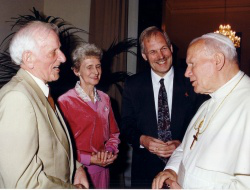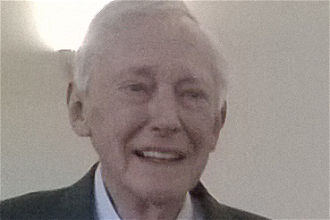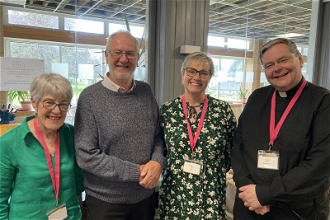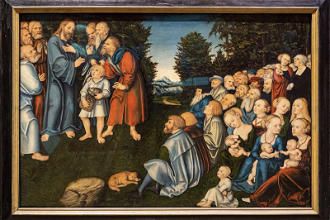Tribute to Tadeusz Filochowski

Mr Tadeusz Filochowski, with his wife Jean, son Julian and Pope John Paul II
Julian Filochowski, who was director of CAFOD for 21 years, gave the following valedictory at his father's funeral on Friday, 23 October, at the Catholic Church of St John the Baptist, in Normanton, West Yorkshire.
Tadeusz Filochowski
14th February 1922 - 16th October 2009
Last Friday morning long before dawn, as my mum and I drove through Altofts en route to Pinderfields Hospital I flicked on the car radio to Classic FM. Astonishingly they were playing 'Stabat Mater' that beautiful 13th century chant of Mary at the foot of the Cross as Jesus was dying: "At the Cross your sorrow sharing; …Let me stand and mourn with you."
And as we drove on, there was a gentle but persistent wind that rustled the leaves into strange ghostly waves across the road in front of us.
They proved to be harbingers of Dad's passing on. Bronchial pneumonia exacerbated by emphysema and long term lung damage finally overcame him and he breathed his last at around 3am.
Dad had six brothers and a sister. They all predeceased him and so, at the ripe old age of 87, Dad was in a real sense the venerable patriarch of this Filochowski family not only in England and the United States but spread out right across Poland. In fact at this very moment to coincide with the funeral there is a requiem Mass being celebrated for him in Warsaw.
My mother, my brothers and I have been filled with great sadness and grief at his passing this week. He will leave a huge empty space in the life of Jean, his wife and our mother, who cared for him so tenderly, so patiently and so arduously, full-time, every day, through these last sunset years of his life. But the truth is there is now a big gap in all our lives.
Four facets of Dad's life we will particularly remember him by…
First, Dad was a proud father, proud of his sons, and absolutely committed to his 'Dalefield Road' family and to sustaining that family as we grew up & moved away. He encouraged us in all our endeavours and he willed the best for us. You could say he wanted us to be true to ourselves as he throughout his life was true to himself.
Second, Dad was a Polish patriot; a brave, courageous and daring man; a man of strong opinions strongly expressed.
Third, Dad was an industrious entrepreneur, blessed with imagination and business acumen and marked by very great generosity
And first and last, Dad was a devout Catholic; a devoted and energetic member of this parish community which adopted him and embraced him from the moment he first arrived and which he in turn has served for more than 60 years.
As we remember him, celebrate his life and pay tribute to him this morning I know that above all he would really and truly want me to recount to you his story once again - and I will do so, briefly, if I may.
Dad was born in 1922 in Ostroleka, 100 kms north of Warsaw, the seventh child of the family. He was brought up on the family farm at Susk Stary. He was educated locally right up to the outbreak of WWII in 1939. Then the farm and the family found themselves first under the Nazi German occupation force and then under Soviet Russian occupation forces.
In June 1941 the family was deported to Siberia. They were put on a train in cattle wagons without food. The journey lasted for two weeks until they reached Topchikha, not far from the city of Novosibirsk. There, KGB officials told them they were second class citizens and they were not to mix socially with local Russians. They were not prisoners but they worked "under direction" on a huge collective farm on a starvation diet - right through the winter of 1941 when temperatures reached -30 degrees centigrade.
In mid 1942 Dad managed to slip away without any travel permits to try to join the Polish Free Army at Tashkent in the very south of the Soviet Union, today's Uzbekistan. Several times as he moved from train to train he just, almost miraculously, avoided arrest - which would certainly have meant a concentration camp in the Gulags; he lost his wallet and more importantly his identity papers. But he had that real sense that God was with him and that he was being protected. On and off trains for a week, with only fruit he could scavenge to eat, he crossed present day Kazakhstan until he finally reached Tashkent.
This was to be the new start for his war. He was issued with new identity papers but because of a clerical error he found himself, like our Queen, with two birthdays - his official birthday 15th February as stated on his identity document and his real birthday 14th February, St Valentine's Day.
He joined up in Tashkent and he signed on for pilot training. He was sent to a transit training camp but conditions became awful as his group waited on the Caspian Sea coast for a crossing to Persia (today's Iran). No shelter, horrendous sun beating down and they were sold badly polluted drinking water which brought on serious dysentery from which Dad thought he would die - and a number of his comrades did die there. When he reached Palhavi in Persia he was almost unconscious; but an army buddy, his own Simon of Cyrene, carried him the four kilometres to the camp and hospital.
Later and still somewhat weak he travelled over the hills from Iran into Iraq where he found the Arabs friendly and welcoming. Next a train down to the port of Basra where he was seriously ill again with jaundice. Then a boat down the Gulf to Pakistan. For two months he was in Karachi before being put on a boat to Bombay in India. As he waited there for a ship to England he learned to play bridge which years later he took up with the likes of Matt Kielty and Jerry Ray in evening sessions at Normanton Conservative Club.
Finally he was put on a vessel to England via Durban in South Africa. It was the 'Empress of Canada' passenger liner turned into a troop ship. It carried this Polish army and air force contingent as well as Greek refugees. However travelling up the coast of West Africa it was torpedoed by the Italian submarine, Leonardo da Vinci, and on 13 March 1943, Dad was shipwrecked. Defective lifeboats led to 400 deaths but Dad found himself on board an over-full lifeboat and he watched as the Empress of Canada went down like the Titanic before his eyes. For four days the ocean current took them 200 miles through shark-infested waters until they were sighted, picked up and taken to Freetown, Sierra Leone - and eventually on to Liverpool.
I think that Dad, like the proverbial cat, had nine lives and he'd probably gone through at least five before reaching Britain at the age of 21. There followed billeting in Blackpool where he learnt English; then Cranwell for radio telegraphy training. He first flew on old Wellington bombers where yet again he had a narrow escape over the Solway Firth when the plane nearly hit a mountain on a night training exercise. For the rest of the war he was with 304 (Polish) Squadron, part of Coastal Command, based first in Benebecula in the Hebrides and then in Cornwall.
He and Jean married in this Church in 1947. After his demobilisation he was offered a training course as a Painter and Decorator. As a child my own first real memory of him is sitting astride a huge motorbike on which he used to travel to work in Wakefield and which he kept under a tarpaulin shelter in the backyard. He soon set up in business on his own, with a handcart and with Len his apprentice, trading as 'Ted Fieldon'. He went on to become a painting and decorating contractor employing over 20 men at one stage. In 1963, together with his cousin Joseph, he bought Preston's bakery in Normanton High Street. With Dad's insistence on investment in modern ovens and baking equipment it became a successful enterprise. My mother & Joseph managed the shop and the bakery for 25 years.
Dad's first 12 years in Britain were really years in exile from Poland; but when it became clear that the Communist regime was there to stay he applied for British citizenship and, like his sons, enjoyed dual - British and Polish - nationality. Yet, as early as 1959, with great courage he travelled overland to visit his family in Poland. Following warnings from the Foreign Office neither he nor my mother were really sure he would be able to get back safely. But he did; and in the early 1960s he twice took the whole family to Poland in a Ford Thames dormobile. We camped by the roadside, and we played Beatles' records all the way there and all the way back! We certainly got to know our Filochowski roots and met our whole huge Filochowski clan. Dad eventually saved up to have a house built in Warsaw and from the mid 1970s till the end of the 1990s he spent almost every summer in Poland.
In the parish here Dad was a dedicated SVP man for years and years and later logically he became a Eucharistic minister for the sick and housebound. He loved the more traditional Polish style of Church. So you can imagine his boundless joy at the election of Karol Wojtila from Krakow as Pope John Paul II. John Paul became second only to Our Lady of Czestochowa in Dad's affection and devotion.
Dad held strong views on religion and politics and he expressed them robustly and volubly. Only late in life did I realise that this was a rather general Polish characteristic nicely illustrated over 10 years ago when we went on a pilgrimage to Rome. To Dad's never-ending delight we secured an invitation to attend Pope John Paul's morning Mass in his private chapel in the Vatican apartments. It was a truly emotional occasion for all of us. But for my father it was sheer bliss; it was as if he had already died and gone to heaven. After the mass the 20 or so guests stand in line to shake hands with the Pope and he exchanges a sentence with each one present. It was the Feast Day of St Stanislaus, Patron Saint of Poland. All the first introductions were in Polish. When it came to me I was presented in English as Julian Filochowski from CAFOD in England. Pope John Paul scowled and then in a raised voice said: "Today is Day for Poland, St Stanislaus' Day, for Polish people" I moved forward and said "Holy Father, please meet my father, Tadeusz Filochowski. He is Polish from Poland." His Vesuvius subsided as he spoke to Dad and, perhaps in recompense for the little outburst, Dad got a dozen sentences of conversation instead of the statutory one - and the Pope told him in some detail how he had swum in the river at Ostroleka where Dad was born. But it was confirmed to me then that 'strong views strongly expressed' was a very widespread Polish trait - which I think all his sons have inherited.
Dad had many health crises over the years with angina, an aneurism, terrible stomach ulcers, and bouts of pneumonia and it's a remarkable feat to have reached 87 years. Some would put it down to the golf which he loved and played several times a week till almost the very end. But I know that what held Dad up and kept him going through thick and thin was his indomitable faith in God, in Jesus Christ together with his mother, Mary, Queen of Poland.
So, dear Dad, dear Ted, Tadeusz Filochowski, proud father and committed family-maker, Polish patriot and stalwart pillar of St John's parish community in Normanton:
May You Rest Now and Forever in God's Peace. Amen




















